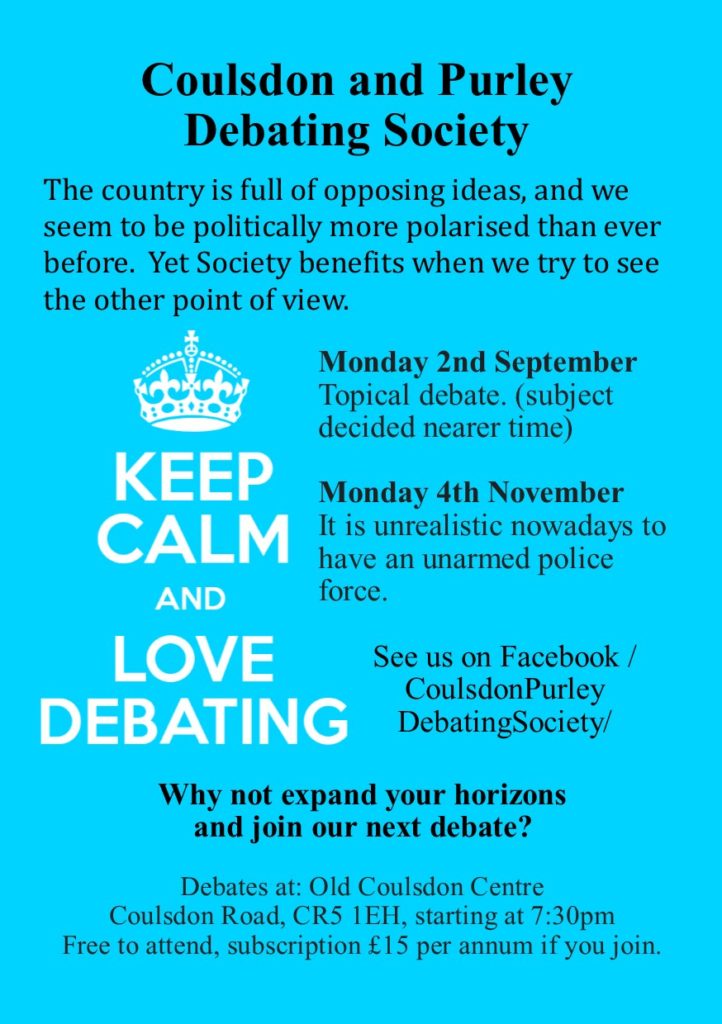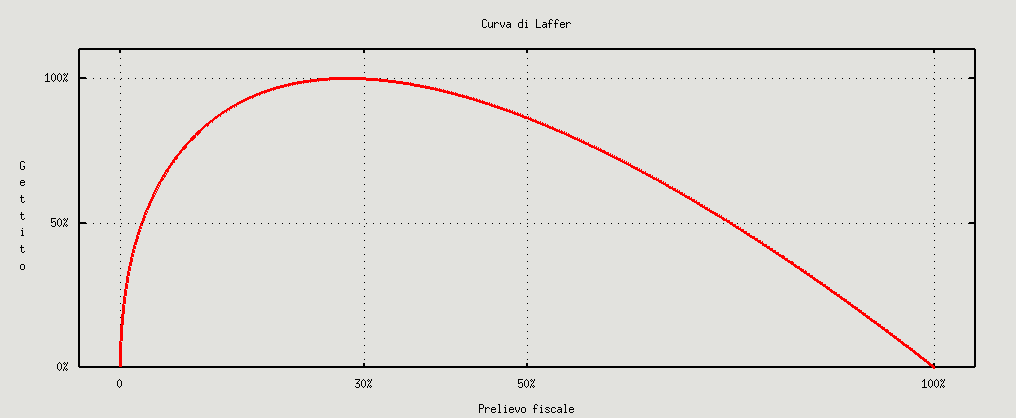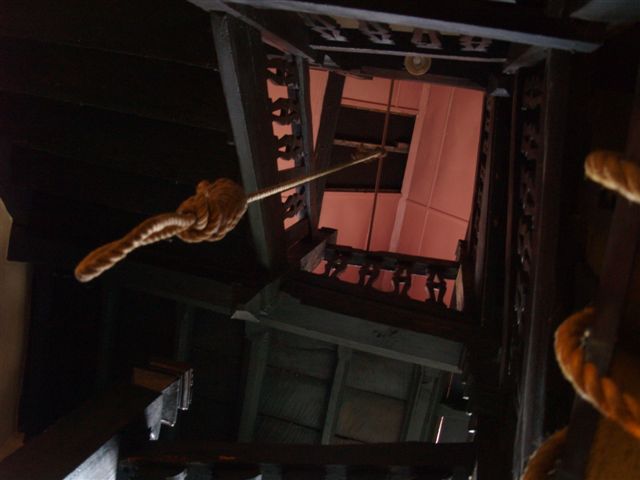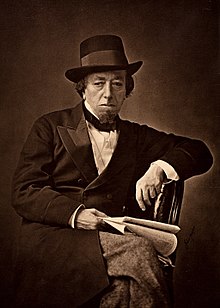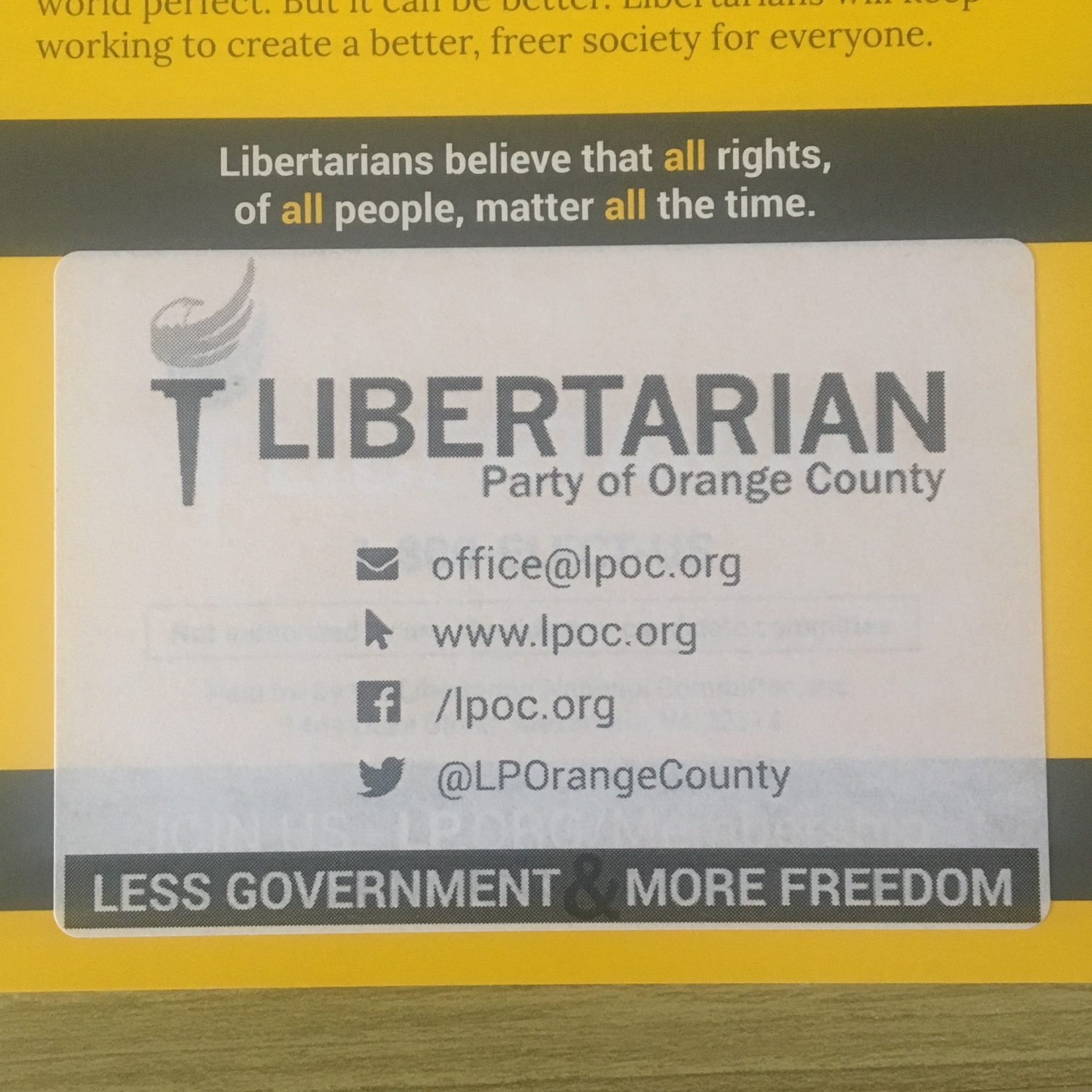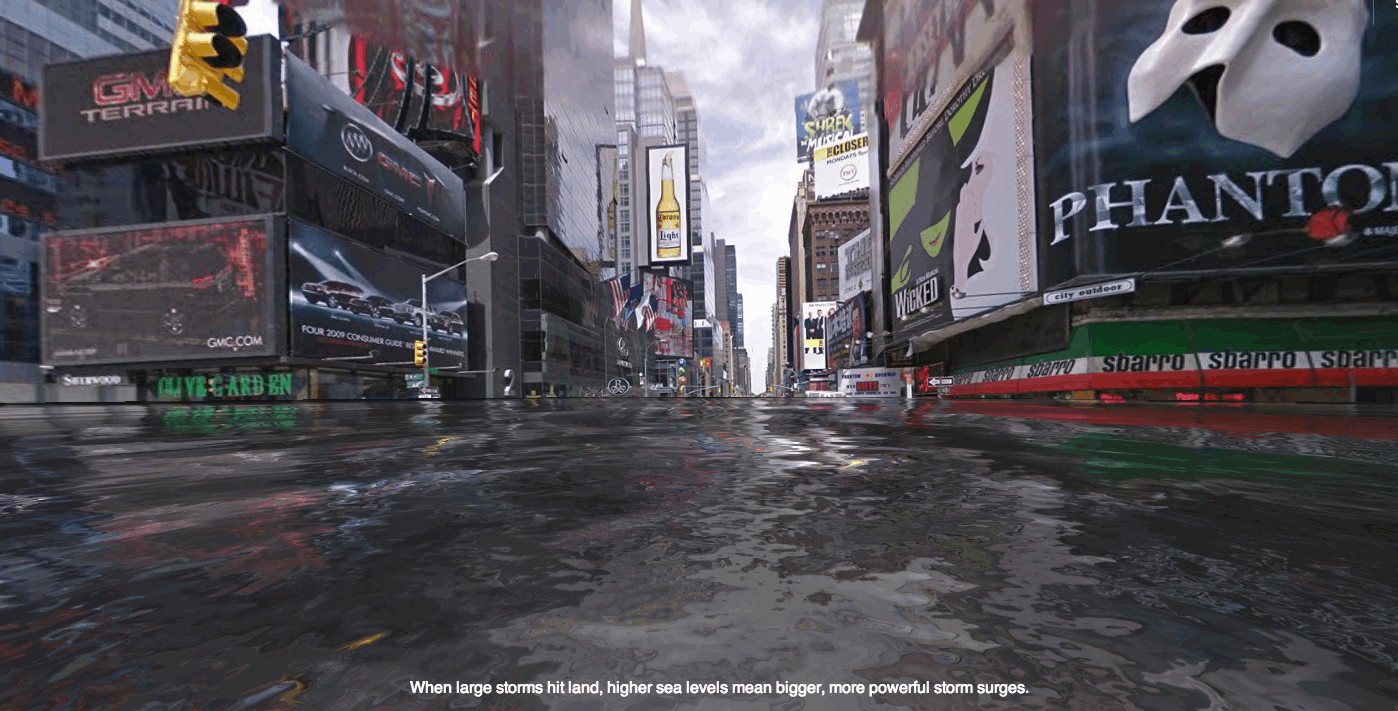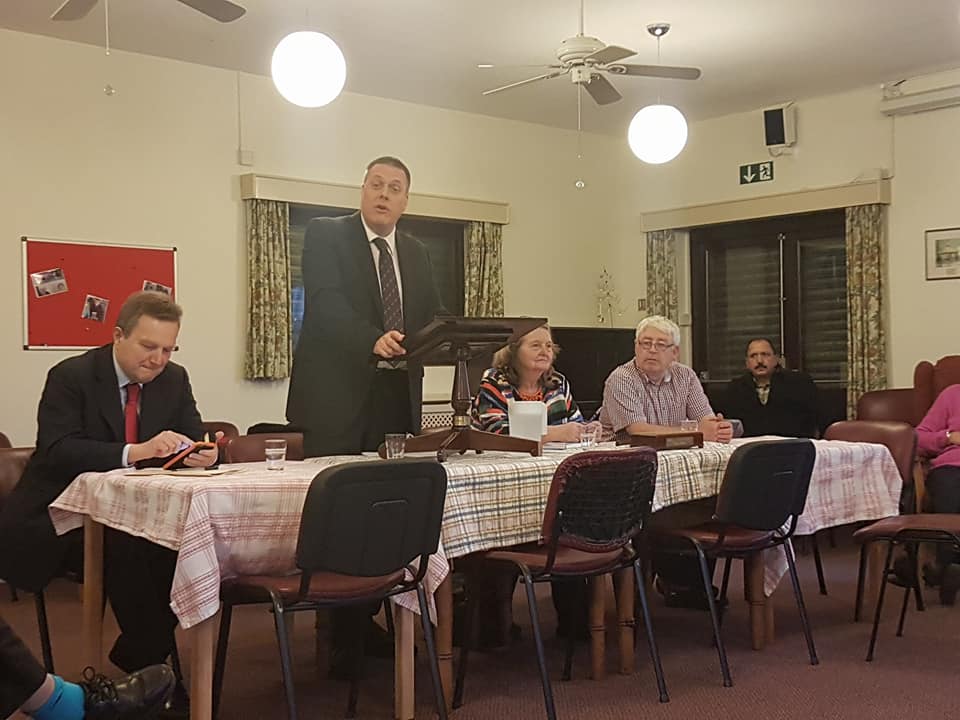On the 4th February the Coulsdon and Purley Debating Society hosted a debate on the question ‘Today’s media are destroying democracy?’
In true debating society style, who proposed or opposed was decided by the toss of a coin. Croydon Constitutionalist Mike Swadling argued in favour of the motion.
Mikes’
argument centred on the Medias inability to represent all fairly, and that this
led directly to a coarsening of our politics and a corrosion of our democracy.
Those of us with unfashionable ideas, both on the left and right of politics and all too often shut out by today’s media. The text of Mikes’ speech is below.
Introduction
Firstly
thank-you to the Chair, to Richard for offering to oppose the motion and to all
for attending tonight.
Today’s
media are destroying democracy?
I
intend to make the argument to you tonight that the Medias inability to
represent all fairly and let a multitude of ideas have voice, has directly led
to many seeking alternative often more extreme voices.
It
has led to a lack of belief in any facts, because only some face challenge, and
it has led directly to a coarsening of our politics and a corrosion of our
democracy.
Ironically
at one time the mass murderer Chairman Mao was more willing to “Let a hundred flowers blossom”
than many are in todays forth estate.
Proposal
I
need to add some definition around the terms in tonight’s debate title.
If
I may take democracy first, democracy is defined as “a system of government by
the whole population or all the eligible members of a state”. This definition really doesn’t go far enough. After all the Democratic People’s Republic of
Korea holds elections for the Supreme People’s Assembly.
All
seats, in what has been called the biggest prison camp in the world North
Korea, are of course won by the Communists.
A democracy that matters needs more than a vote. It needs to be a Liberal democracy. Where rights of the individual are enshrined
in law. It needs to be a place where
“elections have consequence” and are not simply ignored by those already in
power.
Its
needs a demos, a people who can get on with their daily lives, and live in a
community, regardless of the side they were on in the last or for a future
vote. A demos who choose to be together no
matter their politics.
The
Media are, “the main means of mass communication regarded collectively”. This is simply a means. A means isn’t capable of destroying or
building anything. It needs further
definition, so for this debate I will be referencing the Mainstream media.
This being conventional newspapers, television, and
Radio. Organisations that are typically
dedicated to journalism and where they acknowledge bias claim to separate
comment from news.
These
conventional sources are destroying using its dictionary definition of “to ruin
emotionally or spiritually”, the belief we have in our fourth estate, and our
trust that our views, whatever they may be will get a fair hearing from that
mainstream media.
This
lack of trusts between elections leads to a lack of trust in elections.
Ignoring
The
Medias failure to represent all fairly as I have said has led to a growing set
of news sources each targeted at only small communities.
In
driving away so many the Mainstream media has destroyed faith in a collective
set of news or facts that lay at the foundations of our democracy. This destruction doesn’t physically stop us
voting, it doesn’t stop elections happening and it wouldn’t stop rights being
enshrined in law.
However
this destruction of credibility and faith does stop people believing in the
outcome of a votes and in our democratic institutions. That outcome is undermined for instance by
the constant questioning of the motives of why people voted a certain way. Failing to accept that maybe good people can
differ.
It
is also undermined when an underreported view, party or person from outside the
mainstream set of ideas suddenly wins. We
have recently examples of this with, Syriza in Greece, Five Star and Lega in Italy,
Trump in US, Brexit in UK, and close results for the Freedom Party in Austria, Independence
vote in Scotland, AFD in Germany, and Front National in France.
All
and to be clear all results at best unexpected and often completely missed by
the mainstream media. These votes created
a shock to the democratic system and came as a shock to many individuals. Yet these instances are clearly failings of
the Media to understand and report what many are feeling.
Too
many in a media are openly disparaging of any views outside of the ‘acceptable’
set. Often referred to at the Overton
window, also known as the window of discourse.
These are the only publically tolerated ideas. Mainstream media reporting sits inside this
window, even if the ideas outside hold considerable popularity. They only seriously report other views once
elections have happened or where electoral law forces them.
This
has not always been the case. In the 80s
our media would report both Arthur Scargill and Margaret Thatcher. Norman Tebbit and Tony Benn would feature in
print and on screen. Indeed both the TUC
and CBI conferences would be broadcast at times of mass redundancies, strikes
and sadly often violent clashes. Despite
a rather silly attempt to ban their actual voices members of Sinn Féin IRA were
reported as they fought a war against our state.
Alas
no more. The media would not consider
giving prominence to such forthright advocates, for fear their views may
offend.
And
therein lies the problem. If your views
are not covered in the mainstream in the period between elections, and large blocks
of votes are constantly disparaged, why should anyone have faith in the
democratic process?
Undermining
When
supposedly radical, yet often popular ideas aren’t being ignored they are being
undermined. How is this being done?
In
a News at Six report in 2015, Laura Kuenssberg said she had asked Jeremy Corbyn
the following:
“If he were the resident here at Number 10 whether or not
he would be happy for British officers to pull the trigger in the event of a
Paris-style attack”.
His
answer was surprising:
“I am not happy with a shoot to kill policy in general. I
think that is quite dangerous and I think can often be counter-productive”
This
exchange was highlighted to embarrass Corbyn and the Labour party, to make his
views seem odd and outside the mainstream.
After all who wouldn’t expect an armed response to a Paris style attack
that had killed many??
Now
regardless of what you think of Jeremy Corbyn, love of loath, I hope we can all
agree the exchange should be reported accurately. Except of course the actual question
Kuenssberg had asked during the interview was:
“If you were prime minister, would you be happy to order
people – police or military – to shoot to kill on Britain’s streets?”
No
mention of Paris style account. No
allowance for the nuance needed when talking about a general policy, as opposed
to a distinct event.
Source BBC
This
is not a one off. In 2017 the BBCs Nick
Robinson tweeted during the election campaign that:
“No-one should be surprised that Jeremy Corbyn is running v the
‘Establishment’ & is long on passion & short on details. Story of his
life,”
Now
you may agree or disagree with that sentiment, but this is from one of the
leading correspondents from an organisation legally obliged to be neutral commenting
during an election campaign.
I
am sure most Labour members and many voters do not feel Corbyn is ‘short on
detail’ and a neutral BBC reporter should not be offering this opinion.
Source RT
Jeremy
Corbyn has been constantly undermined;
- we
were told he was about to lose power up to the 2017 election;
- we
were told he would lose massively in the 2017 election;
- we
are now told he is nowhere on Brexit.
At
a time when the Conservatives are tearing themselves apart, Corbyn has stood
back and as Oppositions should do, oppose.
In doing this he has kept his party together, despite significant fault
lines, you could say he has played a bit of a political blinder.
Of
course this is not reported, as Corbyn politics sit outside the medias
acceptable window of ideas.
International
These
days many of us receive some of our news from across the globe and global
events affect us all.
In
the United States, the Centre for Responsive Politics found that 65% of journalist’s
political financial contributions went to Democrats in the 2010 election cycle. MSNBC found that 87%, gave to Democrats or
liberal causes.
The
Media Research Centre found that 94 percent of donors affiliated with five major
news outlets also contributed to Democrats between 2008 and 2016.
Source Ballotpedia
In
2016, not a single member of the White House press corps was a registered
Republican. Whilst more than a quarter were
registered Democrats and of course 86% percent said they expect Clinton to win
the election.
Source Free Beacon
How
did that pan out?
In
the two party US system none supported one of the parties. These are a range of journalist’s from
papers, radio and TV, none of whom supported the winning party for the
Presidency and the party that at the time held the Senate, the House and the majority
of Governorships.
Would
you say this is a media that is likely to be trusted by a majority of voters?
It’s
not just the US in 2013, the Ozzies BBC, the Australian Broadcasting
Corporation, journalists were surveyed;
- 41%
would vote Green;
- 32%
Labor;
- and
just 14.7% for the Liberal/Nationalist Coalition.
Source ABC
At
the next Australian general election the Coalition received 45% of the vote, and
the Greens just 8.6 percent. This is a
media wildly out of step with the people.
Balance
If
the reporters themselves are unbalanced from the populace maybe the reporting isn’t’,
maybe those they invite on are more fairly balance?
A
great bellwether is the BBCs Question Time, a show meant to have a panel
representing all our political views.
As
of September 2017 in the 42 Question Time shows there had been since the EU referendum,
Remain panellists have outnumbered Leavers by 137-72.
Leavers
have only outnumbered Remainers in 3 episodes whilst, Remainers dominated in
36.
Given
the majority of the country backed Leave is this right?
Source Guido Fawkes
In
all these examples I would ask again that you put aside your own views and
instead focus on does this lack of balance foster trust in our media as a place
we can democratically come together.
It’s
not that the programme is biased per se.
In the 2014-15 season it had 195 guest appearances. The left wing New Statesman judged these
guest to be 53 for the right, 24 for the centre, and 58 for the left.
But over a similar period the SNP had only been on the Question Time panel six times in a year, in contrast to the LibDems who had been booked for 22 appearances when they were the third biggest Westminster party.
UKIP
appeared on just one in four programmes, during a period they won the European
elections, were trending between 10 to 20% in the polls and gain 4 million
votes in a general election.
Source The National
Indeed
in the same period just 5 guest came from the Green party and Respect combined.
It
cannot seriously be said that this lack of coverage of parties outside the
Medias allowable set of ideas truly represents the views of licence fee payers?
Question
Time has non-political guests. During
this time they had 38 Journalists, 10 Celebrities, 3 from Business, a Trade unionist,
3 Academics, 2 Religious guest, 2 Campaigners and 1 overseas guest.
Source The New Statesman
How
do these numbers represent the:
- 6.23
million Trade union members in the country?
- 6
million regular churchgoers?
- 15
million people who volunteer regularly
- 4.8
million Self-employed, and 25 million private sector employees?
The
broadest definition, gives all of these groups combined just 8 of 60 neutral guests,
yet we have 38 journalists and 10 celebrities on the panels.
This
is a media class talking to and representing a media class, and not talking to
or representing you and me. Thereby
failing to perform the democratic function of the fourth estate.
The
media excludes so many, because in spending so much time talking to themselves,
they develop a group think and their reporting falls into a pre-defined narrative.
Most
weekends in London some thousands of people are marching for campaigns they
believe in. Whether the protests be from
Kurds, Tamils, Uyghurs, Tibetans, Environmentalists, Tommy Robinson supporters,
Socialist Workers, Trade Unionists or many large faith celebrations. These often large marches get no mainstream media
coverage.
Indeed
this weekend I notices Croydon North MP Steve Reed had posted pictures from a
General and Municipal Workers Union rally.
Desperate for content for this speech I searched the internet for news
on the rally. Despite decent attendance,
and a reasonably senior opposition MP attending. I simply couldn’t find any. No one bothered to report it.
They
simply do not fit their narrative. Somehow
rallies and even when thousands are marching are not as significant as a Tweet
or Instagram post fellow member of the media.
Even
locally we see a poor reporting of politics in Croydon. Now whilst I would clearly like to thank the
wonderful dedicated journalists who have reported the press releases I have
sent them. All too often the local
papers will simply report the latest press release from the council and little
else.
Their
narrative does not extend to the non-partisan but often political activities of
local residents associations, the large number of Socialist events emanating
from Ruskin House, the press releases of opposition councillors or minor
parties in the borough.
Indeed
during the referendum only the sadly now defunct Croydon Citizen reported on
either sides activities, nothing from the Croydon Advertiser or Croydon Guardian
about large local dynamic local campaigns.
During
that period I was interviewed by German, French, Korean, and Danish TV, Radio
and Papers. Not once was I interviewed
by someone from the mainstream Croydon press.
A
photoshoot at a new venue with the sitting MP is possibly more newsworthy than
the many local campaigns that drive democracy.
Should this mean the other local campaigns should be excluded from all
coverage?
Left
or Right is an outdated way of viewing media bias it is now whether you are inside
out outside their groupthink.
I
started by saying I intended to make the argument to you that the Medias
inability to represent all fairly and let a multitude of ideas have voice, has
directly led to many seeking alternative often more extreme voices.
We
see that many people receive their news via Facebook, Twitter, YouTube and
other social media sources. Momentum, Brietbart,
The Canary, Al Jazeera, and Russia Today have for many replaced traditional media
where, although our opinions may differ we coalesce around a basic set of
events, news source and ideas needed for a functioning democracy.
The
lack of us ever coming together enables us to more readily attack each other’s
motives and attack each other as individuals rather than simply questioning
each other ideas.
Not
feeling represented between elections makes us less likely to participate in and
trust in elections.
By
this means the media are destroying our democracy.
Summing up
I
have been making the argument that if you sit outside the Medias acceptable
narrative you are at first ignored then undermined. This leads to an alienation that undermines our
democracy.
In
the US they dismissed the chances of Trump winning, now attack anyone who
supports him. No matter the truth or age
of those involved.
You
may have seen reports in the last couple of weeks of the standoff between
students from Covington Catholic High School and Nathan Phillips at the Lincoln
Memoria in Washington. I want to share
this from CNN
“Videos of the confrontation show a smiling young man in a red
Make America Great Again hat standing directly in front of the man, who was
playing a drum and chanting.
“Nathan Phillips, an elder with the Omaha tribe, said the
confrontation felt like “hate unbridled.” In the moment, he said he
was scared for his safety and the safety of those with him.”
Except
this simply did not happen. The entire
report is and was at the time a provable lie.
If Mr Phillips was scared, why then did he walk directly into the group
of students who were simply waiting for a bus?
CNN
and other news agencies including the BBC and Sky News here knew this, they had
the extended video that shows what I have just described.
Of
course they had a native, a set of acceptable ideas. Their narrative was MAGA hat bad, Christian’s
bad, Native Americans good. Facts at no
point were allowed to get in the way of this prejudiced view.
Incidentally
I am not mentioning the name of the 16 year old involved, because I am simply
unlike the mainstream media not attacking someone who is innocent and legally
not an adult. Those so called reporters that
did should be thoroughly ashamed.
Source CNN
You
can understand why Donald Trump often refers to CNN as ‘fake news’. How much faith in CNN and the mainstream
media do 63 million Trump voters or 70 million US Catholics attack now have?
Over
here perhaps the most egregious example of the media narrative at play in the
past year has been in the treatment of Jordan Peterson.
His
book 12 rules for life is a UK Amazon Best Seller. Shows here were sold out and he is an
internet sensation. In short he is
popular, very popular.
But
his beliefs in traditional values sit outside the mainstream media narrative.
His
interviews on BBCs Hardtalk, The Today Programme and famously on Channel 4 with
Cathy Newman’s showed the worst the media has to offer.
They
hectored him;
- accused
him of being angry, he was calm;
- accused
him of being sexist, no evidence was given;
- accused
him of saying things he has never said.
In
the course of the interview Cathy Newman asked:
- ‘What
gives you the right to say that?’ – a question that shouldn’t be asked in a
free country.
- ‘I
think I take issue with (that)’ – why is a journalist who role is to ask questions,
taking issue, especially on a TV channel legally bound to be neutral?
He’s
popular, very popular. His is most popular
with younger men and women who are struggling with fitting in. Has the Mainstream media helped bring them in
or deliberately pushed them out?
This
is a media that won’t accept you if you don’t confirm to their views. They try to ignore ideas outside their agenda
and then if they can’t ignore the ideas, attack those that support them. This alienates large portions of our society,
often the majority, and undermines our democracy as we lack a common narrative
of events.
I will finish by quoting Douglas Murray the Spectator columnist on the Cathy Newman interview. This nicely summarises so much wrong with the media.
“If yesterday’s interview is anything to go by, all she has is
attitudes. And lazy attitudes at that.
That isn’t news. It isn’t even interviewing. It is
grandstanding.
This nation’s broadcasters should feel ashamed.”
Source The Spectator
